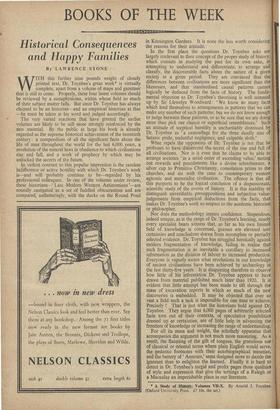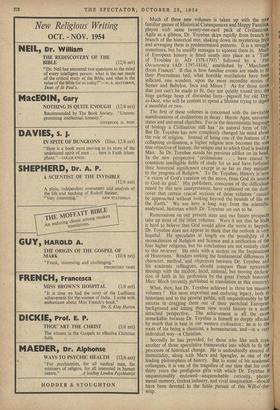BOOKS OF THE WEEK
Historical Consequences and Happy Families
By \LAWRENCE STONE WITH this further nine pounds weight of closely printed text, Dr. Toynbee's great work* is virtually complete, apart from a volume of maps and gazetteer that is still to come. Properly, these four latest volumes should be reviewed by a metaphysician, within whose field so much of their subject matter falls. But since Dr. Toynbee has always claimed to be an historian—and an empirical historian at that —he must be taken at his word and judged accordingly.'
The very varied reactions that have greeted the earlier volumes are likely to be still more strongly reinforced by the new material. By the public at large his book is already regarded as the supreme historical achievement of the twentieth century : a compendium of all the significant facts about the life of man throughout the world for the last 6,000 years, a revelation of the natural laws in obedience to which civilisations rise and fall, and a work of prophecy by which may be unlocked the secrets of the future.
In violent contrast to this popular impression is the careless indifference or active hostility with which Dr. Toynbee's work is—and will probably continue to be—regarded by his professional colleagues. In one of the volumes under review, these historians—' Late Modern Western Antinomians '—are roundly castigated as a set of fuddled obscurantists and are compared, unflatteringly, with the ducks on the Round Pond in Kensington Gardens. It is none the less worth considering the reasons for their attitude.
In the first place the questions Dr. Toynbee asks are largely irrelevant to their concept of the proper study of history, which consists in studying the past for its own sake, in attempting to understand and differentiate, to arrange and classify, the discoverable facts about the nature of a given society in a given period. They are convinced that the differences between civilisations are more significant than the likenesses, and that standardised causal patterns cannot logically be deduced from the facts of history. The funda- mental objection to Dr. Toynbee's theorising is well summed up by Sir Llewelyn Woodward : ' We know so many facts which lend themselves to arrangements in patterns that we can make any number of such patterns; but we do not know enough to judge between these patterns, or to be sure that we are doing more than pick out chance or superficial resemblances.' Such an attitude of sceptical humility is uncharitably dismissed by Dr. Toynbee as ' a camouflage for the three deadly sins of Satanic pride, undutiful negligence, and culpable sloth.' What repels the opponents of Dr. Toynbee is not that he professes to have discovered the secret of the rise and fall of all civilisations. Nor is it even that he claims to be able to arrange societies ' in a serial order of ascending value,' meting out rewards and punishments like a divine schoolmaster, a silver cup to Primitive Christianity, consolation prizes to the churches, and six with the cane to contemporary western agnostic and materialist civilisation. The offence is that all this purports to be the logical conclusion of a dispassionate. scientific study of the events of history. It is this inability to distinguish unverifiable presuppositions and subjective value- judgements froth empirical deductions from the facts, that makes Dr. Toynbee's work so suspect to the academic historian or philosopher. Nor does the methodology inspire confidence. Stupendous, indeed unique, as is the range of Dr. Toypbee's learning, nearly every specialist bears witness that, so far as his own limited field of knowledge is concerned, guesses are elevated into certainties and conclusions drawn from incomplete or partially selected evidence. Dr. Toynbee has struggled heroically against modern fragmentation of knowledge, failing to realise that such fragmentation is as inevitable a corollary to increased information as the division of labour to increased production. Everyone is vaguely aware what revolutions in our knowledge of ancient civilisations have been achieved by archaeology in the last thirty-five years. It is disquieting therefore to observe how little of his information Dr. Toynbee appears to have drawn from material published much later than 1920. It is evident that little attempt has been made to sift through the mass of excavation reports in which so much of the new discoveries is embedded. It may be objected that over so vast a field such a task is impossible for one man to achieve. Precisely ! That is just what the historians hold against Dr. Toynbee. They argue that 6,000 pages of arbitrarily selected facts torn out of their contexts, of speculative possibilities dressed up as certainties, are of little help in advancing the frontiers of knowledge or increasing the range of understanding. For all its mass and weight, the scholarly apparatus that accompanies the argument is not much more reassuring. As a result, the flaunting of the gift of tongues, the gratuitous use of classical or oriental terms where plain English would serve, the pedantic footnotes with their autobiographical minutiae, and the battery of Annexes,' seem designed more to dazzle the ignorant than to enlighten the learned. Finally it is hard to detect in Dr. Toynbee's turgid and prolix pages those qualities of style and expression that give the writings of a Ralegh or a Macaulay an imperishable place in our literature.
• A Study of History, Volumes By Arnold J. Toynbce. (Oxford University Kress. £7 10s. the set.) Much of these new volumes is taken up with tho noA familiar games of Historical Consequences and Happy Families, played with same twenty-one-card pack of Civilisations, Agile as a gibbon, Dr. Toynbee skips rapidly from branch to branch of the historical tree, shaking down its mysterious fruit and arranging them in predetermined patterns. It is a struggle sometimes, but he usually manages to squeeze them in. Much of European history is fitted neatly into place as a ' Time of Troubles (c. AD 1378-1797) ' followed by a ' Pas Oecumenica (AD 1797-1814),' established by Marchmen (from France).' If this is how familiar events are made to fit their Procrustean bed, what horrible mutilations have been inflicted, one wonders, upon the more recondite stories of Sumer and Babylon, Inca and Minos ? As for those items , that just can't be made to fit, they are quietly tossed into the huge garbage heap of discarded facts—pigswill for old Dry- as-Dust, who will be content to spend a lifetime trying to digest a mouthful or two.
The first of these volumes is concerned with the inevitable manifestations of civilisations in decay : Heroic Ages, universal states and universal churches. For in the deterministic language, of biology a Civilisation still has ' its natural term -of life. But Dr. Toynbee has now completely changed his mind about the role of religion. Instead of being one of the features of a collapsing civilisation, a higher religion now becomes the sole true objective of history, the unique end to which God is leading Man. So Dr. Toynbee stands his previous edifice on its head. In the new perspective ' civilisations . . . have ceased to constitute intelligible fields of study for us and have forfeited their historical significance except in so far as they minister to the progress of Religion.' To Dr. Toynbee, History is noW ' a vision of God's creation on the move, from God its source to God its goal.' His publishers, conscious of the difficulties raised by this new interpretation, have explained on the dust- cover that certain crucial sections of these volumes cannot be approached without looking beyond the bounds of life on the Earth.' We are here a long .way from the scientific, analytical, historian which Dr. Toynbee set out to be.
Ruminations on our present state and our future prospects take up most of the other volumes. Were it not that he finds it hard to believe that God would allow the worst to happen, Dr. Toynbee does not appear to think that the outlook is verY hopeful. He speculates at length on the possibility of a reconciliation of Religion and Science and a unification of the four higher religions, but his conclusions are not entirely cleat to this reviewer. He ends with a section on the Inspirations of Historians. Readers seeking the fundamental differences in character, method, and objectives between Dr. Toynbee and his academic colleagues, should compare these egocentric musings with the modest, lucid, rational, but moving declara- tion of faith in his profession by the great French historian Marc Bloch (recently published in translation in this country).
What, then, has Dr. Toynbee achieved in these ten massive volumes ? His most important and enduring legacy, both to historians and to the general public, will unquestionably be Ine success in dragging them out of their parochial European background and letting them view world history in a more detached perspective. The achievement is all the ' more remarkable because Dr. Toynbee is himself so deeply affected by much that is best in our western civilisation : he is to the roots of his being a classicist, a humanitarian, and—in a verY individual way—a Christian.
Secondly he has provided, for those who like such toys, another of those speculative frameworks into which to fit the processes of historical change. He is undoubtedly assured of immortality, along with Marx and Spengler, as one of the leading philosophers of history. But to some of his academic colleagues, it is one of the tragedies of our time that for over thirty years the prodigious gifts with which Dr. Toynbee is unquestionably endowed—unquenchable curiosity, pheno- menal memory, tireless industry, and vivid imagination—should have been devoted to the futile pursuit of this Will-o'-the- wisp.



































 Previous page
Previous page